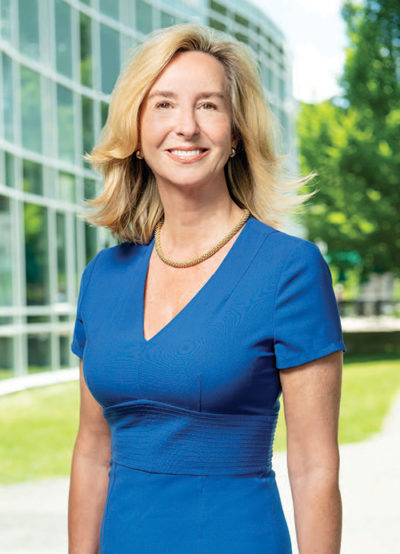
Photo: Webb Chappell
Babson President Kerry Healey
The weekend featured an impressive collection of speakers, panelists, and international business leaders, facilitating thoughtful discussions and a lively exchange of ideas about the future of global enterprise and entrepreneurship. This year, we also were joined by 27 student ambassadors, including several of our incredible Global Scholars, who inspired us with their vision and ambition to create economic and social value everywhere.
One of the highlights of this year’s conference was the official launch of Babson’s Institute for Family Entrepreneurship, a new hub of teaching, research, and innovative programs dedicated to advancing entrepreneurial families around the world. An estimated 70 to 90 percent of annual global GDP is created by family businesses, according to the Family Firm Institute, and studies show that family businesses tend to be more socially responsible and focused on the triple bottom line of people, planet, and profits. The multigenerational survival of family enterprises is critical to global job creation, prosperity, and positive social impact.
When Babson was founded nearly 100 years ago, its primary focus was to educate the sons of businessmen—in 1919, Babson was all male—and prepare them to take over their family businesses. Since then, Babson has remained at the forefront of educating entrepreneurial families and conducting research and programming to help them achieve continued growth. Today, half of Babson’s students come from entrepreneurial families, and as we approach our Centennial, supporting family enterprises remains a key priority.
BCW also provided an opportunity to introduce Lauri Union, the Institute for Family Entrepreneurship’s new executive director, to the Babson community. Lauri has a long history of supporting entrepreneurial families and is known for the turnaround and sale of her family business after becoming its president and CEO when she was just 27. Under her direction, the Institute will continue Babson’s role as an innovator and leader for family entrepreneurship (for more, see Entrepreneurship Through the Generations).
During the past four years, BCW has grown and evolved into the world’s foremost gathering of entrepreneurial thinkers. I am excited to share that next year, as part of Babson’s Centennial celebrations, BCW will come home to Babson with events in and around Boston’s innovation ecosystem.
After a wonderful BCW experience (to see photos from Madrid, go to Connections), I’m happy to be back in Wellesley, enjoying a beautiful New England summer and preparing to welcome the Class of 2022 to campus this fall. I hope you have enjoyed a relaxing summer with family and friends, and I look forward to seeing you at Back to Babson in September.

Kerry Healey
]]>From the wheel of his Ford pickup, which pulls his 33-foot-long RV trailer, Holland has driven many a mile. As rest stops, billboards, and exit signs blur by, his eyes may watch the road, but his mind roams elsewhere. “I’m trapped for hours with my thoughts,” he says. “You can’t escape them, but in a way, that’s good. Your mind can dwell on problems. You start thinking, how can I fix this? I’ve had breakthroughs with self-conversations.”
Holland is the founder and executive chairman of Storyblocks, a subscription service based in Arlington, Virginia, that provides stock images, audio, and video. Holland started the company the year before he enrolled at Babson, a kid chasing a dream in his parents’ house. Since then, it has grown into a successful enterprise with 100 employees and a digital library of 10 million files that subscribers can peruse. In 2017, the company earned $32 million in revenue.
That entrepreneurial journey was enthralling and rewarding, but it also overwhelmed Holland at times, leaving him feeling unsettled and burned out. “I was so immersed. I needed to come up for air,” he says. “I had a desire to get up and run.”
The RV, with its promise of wanderings and adventure, proved his salvation. He bought it in 2013. Out of town for a wedding, Holland found himself with some time to kill and, on an impulse, checked out an RV dealership. He always had enjoyed road trips, and suddenly, as he talked to the salesman, the idea of owning an RV began to feel right. Two weeks later, it was his.
At first, though, Holland was a little hesitant to use it. As CEO, he was fully engrossed in running the company, so disappearing in an RV didn’t seem like a smart idea. “I was really worried that, if I wasn’t present, things would fall apart,” he says. But his colleagues supported him, told him he deserved some time away, so Holland began taking regular jaunts of a week or more in his RV. He was never completely unplugged and was almost always reachable, but nonetheless, he felt lighter. The stress of the office melted away with the miles. “When I’m traveling,” Holland says, “I don’t dwell on anxiety.”
Fast forward to 2016. Holland removed himself from the company’s day-to-day responsibilities, stepping down as Storyblocks CEO and becoming executive chairman, and took to the road full time. He traveled from coast to coast and was amazed at the country’s beauty. “If I had to summarize America in one word, it’s variety,” he says. “I can go through the lush greens of Kentucky, to Tornado Alley and the flatlands of Oklahoma, to the majestic mountains of Colorado, and then end up in Malibu for drinks on the beach.”
Before taking to his RV, Holland hadn’t traveled to the heart of the country, to all those states that he and so many of us simply fly over on the way to somewhere else. Now he explores every nook and cranny of the U.S. and makes the effort to reach out and talk to people, whether coal miners in West Virginia or tailgaters at a NASCAR race in North Carolina. “I’ve met people from all walks of life,” he says.
Holland’s companion for many of these adventures has been his then-girlfriend, now wife, Mary Ashley, whom he married last year. Holland took it as a good sign that they got along so well even after spending months together traveling. “We were in close quarters, and we didn’t want to kill each other,” he says. Still, a few months ago, Mary Ashley decided to return to the couple’s often vacant home in Vail, Colorado, and resume working as a veterinarian. Around that time, Holland began to feel something he hadn’t felt in a while: the entrepreneurial itch. Yes, travel was wonderful, but after two years on the road, he missed the everyday fulfillment of working and business. “It hit me like a bag of bricks,” he says. “I got to do something.”
Holland had an idea. Having visited the 48 contiguous states in his RV, driving about 50,000 miles along the way, he saw that many RV parks are congested and unappealing. He then thought about how the country is full of farms and wineries. What if a company existed that could help RV owners find places like that to park their vehicles for the night?
Holland contemplated starting such a company but then discovered one already existed: Harvest Hosts. He contacted the owners, who had been running the venture for nine years, and asked if they were up for selling. After some negotiations, Holland bought Harvest Hosts in May and now runs a company that aligns perfectly with his love of RVs and traveling.
An annual membership at Harvest Hosts allows RV owners to stay for free at a network of more than 600 farms, vineyards, museums, and attractions, and Holland is hoping to sign up hundreds more locations. While he holed up in Vail for part of the summer, he remains on the road more often than not these days, with his wife often flying out to meet him. His RV has a cozy workstation, and his days have a predictable rhythm, with Holland taking business calls at 9 and 10 a.m. before hitting the highway.
For Holland, the road remains his office, his home away from home, his inspiration. “I find it hard to ease back on traveling,” he says. Perhaps one day he and Mary Ashley will have children, but he doesn’t think even that will curtail his wanderlust. “I know a lot of parents who take their kids with them,” he says. “You can throw your kids in the RV and have total flexibility.”
Traveling with Kindness
Leon Logothetis’ life is a series of adventures. And those adventures have put him in some daunting situations. Earlier this year, for instance, Logothetis ’99 embarked on a trek from Alaska to Argentina in a 50-year-old yellow Volkswagen Beetle. “I arrived in Alaska, it’s minus 30, and I’m in a car that doesn’t have any heating,” he says. In that instant, one thought blared in his head: “You’ve gone insane.”
To understand how Logothetis arrived at that moment, however, involves going back to 2005, when he was living in London and working as a stockbroker. From the outside, his life seemed like a success, but Logothetis was uninspired and unhappy, living what felt like some other person’s idea of the perfect existence. “It wasn’t me,” he says. “I reached a point where I was in a terrible place. The pain was so much, the feeling that I was wasting my life.”
Watching The Motorcycle Diaries, a romantic road movie about guerrilla leader Che Guevara’s travels as a young man, Logothetis grew inspired. “It touched me. I always felt this urge to go on an adventure,” he says. “I wasn’t built to sit behind a desk. I was built to connect. I was built to meet the world.” Feeling like he had no other option, he quit his job and set off on a life very much beyond the typical, a decision that left those around him baffled. “They thought I was a nut job,” he says.
Since then, Logothetis has become a traveling man, visiting more than 90 countries and undertaking a slew of fantastical journeys that have become the basis for books and TV shows. In its three seasons, Amazing Adventures of a Nobody, which aired on the National Geographic channel and also led to a book by the same name, Logothetis traveled across the U.K., the U.S., and Europe on 5 pounds, 5 dollars, and 5 euros, respectively, per day. In Live, Love, Explore, which is part memoir, part self-help book, Logothetis details his adventures and the life lessons he learned from them. For his most recent project, The Kindness Diaries, which was first a book that later became a Netflix TV show, Logothetis traveled around the world on a vintage motorcycle, relying on the kindness of strangers for food, gas, and shelter.
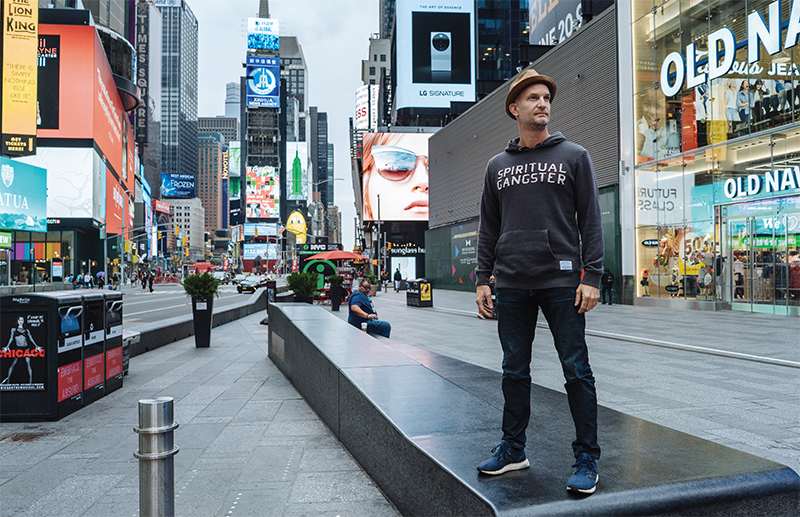
Photo: Gene Smirnov
New York’s Times Square holds special significance for adventurer Leon Logothetis ’99, who has visited more than 90 countries. He once launched a cross-country trek from there, traveling all the way to Hollywood, California, on only $5 a day.
Logothetis admits that approaching strangers and asking for help isn’t easy. Most people turn him down. But when he’s in an unfamiliar town and desperate for a place to sleep, he keeps trying. “You always find that person,” he says. “It’s about speaking to their heart.”
Whenever someone has helped him, he makes sure to return their kindness in some way. In one episode of The Kindness Diaries, Logothetis talked with a man named Tony in a Pittsburgh park. When Logothetis asked Tony if he could stay with him that night, Tony revealed that he was homeless. “My initial reaction was shame,” Logothetis says. “I’m asking to stay at his house, and he has nothing. What’s wrong with me?” But Tony offered to share some food and blankets, so Logothetis, deeply moved by the gesture, spent the night sleeping next to him on the concrete. Calling Tony one of the most generous men he has ever met, Logothetis says, “He taught me true wealth is not in our wallets. If he can be kind and he has nothing, then I have no excuses.” The next day, Logothetis offered to help find Tony housing and put him in a certificate program. Tony was left with tears in his eyes.
When Logothetis started going on adventures, he was motivated by self-preservation and the need to find fulfillment in his life. “I wanted to free myself,” he says. But as the years passed, and he encountered more people and drove mile upon mile, that motivation has changed. Now he hopes to embolden people to spread kindness and also to leave their unsatisfying jobs behind. “It’s not good enough to just travel for yourself,” he says. “My mission is to do everything in my power to inspire others to see there’s another way to live.” He has heard from thousands of people who have been touched by his travels. “I feel honored. That’s why I do this,” Logothetis says. “It makes traveling worthwhile. It makes freezing your ass in Alaska worthwhile.”
Speaking of the cold of Alaska, that’s where Logothetis started filming season two of The Kindness Diaries. His journey in that old Beetle from Alaska to Argentina, which took almost four months, was recently completed. The new season is set to premier on Netflix in December. Looking ahead, Logothetis already is planning the show’s third season, which will be a trek from South Africa to Finland, a more than 9,000-mile journey. “You never know what’s going to happen,” he says. “I look forward to the Sudanese border.”
While he’s a man at home in the world, Logothetis does rent a house in L.A., even if adventures and motivational speeches, of which he delivered 100 last year, mean he’s rarely there. Still, he enjoys those brief moments of rest, until it’s inevitably time to get moving again. “I get itchy feet,” he says.
Connecting with Culture
A prolific traveler for her job, Jaclyn Leibl-Cote, MBA’15, is away from home about 90 days in a typical year. Ask where she went last year, and she’ll start rattling off destinations, Dubai, Abu Dhabi, Spain (twice), Canada, the U.K., before pausing to think. The trips have become a blur in her mind. “I’m definitely not remembering,” she says.
Leibl-Cote is president of her family’s business, Collette, a 100-year-old travel company based in Pawtucket, Rhode Island. With close to 700 employees around the world, Collette offers over 160 group tours, which take travelers to 56 countries. Leibl-Cote and her team supervise the dozens of guides who bring these tours to life, as well as examine the company’s offerings to see which tours to improve and add.
Everything on a tour is planned. Leibl-Cote and her team vet hotels, restaurants, bus and train companies, and attractions, and they travel to destinations to perform the vetting. Such excursions may sound exciting, but the work is exhausting, the days long and tiring. A city may boast hundreds of restaurants, for example, and the team’s job is to winnow those down and select the right ones for the tour. “When I interview people for a job, I say, ‘This isn’t a vacation,’” Leibl-Cote says.
Collette always is thinking about its tours and every year adds between 10 and 20 new offerings. The travel industry is full of copycats, says Leibl-Cote, noting that other travel companies have copied Collette’s tours down to the itinerary. “You can’t trademark the world,” she says. “We have to always be creative.” The company also must try to anticipate where its customers, who often seek destinations that haven’t been “discovered” yet, will want to go. The decision process is part market research and part intuition. Sometimes the company is wrong, but other times it nails it. “We launched Iceland with one tour,” Leibl-Cote says, “and it just took off.”
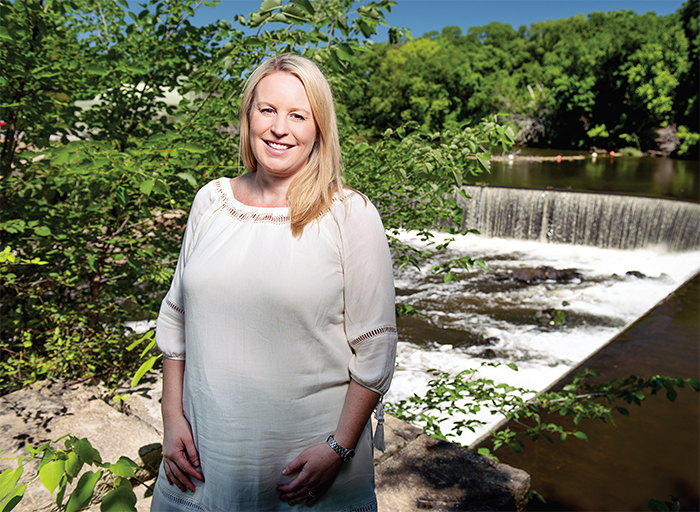
Photo: Webb Chappell
Jaclyn Leibl-Cote, MBA’15, is president of Collette, a 100-year-old travel company that’s based in Pawtucket, Rhode Island, in an office along the banks of the Blackstone River.
Collette also must keep up with travelers’ expectations, which have changed over time. “Travel used to be about the bucket list,” says Leibl-Cote. “People would want to see the Eiffel Tower. They would want to go to the Colosseum. People want experiences now. They want to meet people in a local village, to sit in a cafe, to do a cooking demonstration, to feel like they’re living like a local. We’re connecting people with culture, we’re connecting them with experiences.”
The ability to connect with a culture, to immerse oneself in it, is one of the main allures of travel for Leibl-Cote. “For me, travel is the biggest educator. It is a gift,” she says. “I live in Rhode Island. That would be a very small place to stay. You have to spread your wings and see what’s out there.” Leibl-Cote doesn’t make assumptions about a country or culture from what she sees in the media. “I see it with my own eyes,” she says. “When you go there and walk in the footsteps of people and talk to them, that can bridge stereotypes.” Leibl-Cote hopes all Collette customers take away such a deeper understanding of a place from their trips. “I hope they feel connected to the culture they visited, that they come back and have an appreciation of the people,” she says.
Nowadays, travelers can do so much of their own trip planning online, from booking hotels and flights to researching restaurants and sights to see, but sifting through the myriad choices the Internet provides can be difficult. That’s why the personal touch that Collette provides is still valued, says Leibl-Cote. “We had a record year in 2017,” she says. “We’re seeing upward trends in growth.”
Leibl-Cote is one of eight family members who work full time at Collette. Her grandfather bought the business in 1962, and she has worked there for much of her adult life. Her three children, twin 7-year-old boys and a 5-year-old girl, represent the company’s next generation. “They see the hard work that goes into it,” she says. “I do it for the three of them. It’s a family business. I want to pass it on to them.”
Of course, leaving the three of them to go on work trips isn’t easy. As much as Leibl-Cote loves to travel, as much as she loves adding another stamp to her passport, she also loves to come home. When her airplane lands at Boston’s Logan Airport and the pilot over the intercom says, “Welcome home,” she takes that to heart.
Sailing on the Wind
Ever since he was a boy, Robert Lahue ’99 wanted to take to the sea. For a long time, that dream was his alone. After graduating from Babson, however, he and his then-girlfriend, Betsy, sailed off the East Coast for a year. When that voyage was done, they looked to the future and vowed to sail again together one day. “I found someone who embraced my dream as well,” he says. “It became our dream.”
Robert and Betsy got married, had three boys, and built careers. She was an executive at a medical device manufacturer, while he was a real estate investor. They hadn’t forgotten about their dream of the sea, and in fact were setting aside 10 percent of their income every year toward making it happen. But still, time was passing. They felt settled in the New Jersey town they called home. Could they really uproot their family, walk away from their careers, and take off on a long sailing adventure? “We realized we have to do this before the motivation was lost,” Lahue says. “I wouldn’t have been happy with myself if we didn’t make it happen.”
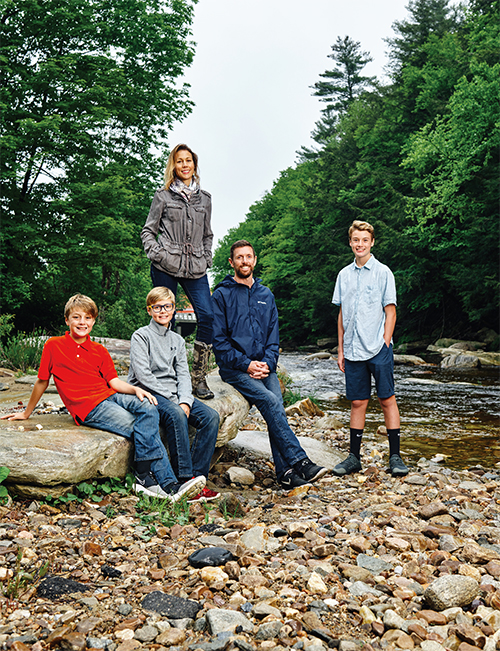
Photo: Douglas Levy
The Lahue family (left to right), J. Oliver, Myles, Betsy, Robert ’99, and Henry, now make their home in Stratton Mountain, Vermont, after spending nearly two years sailing aboard the Alkemi.
So they decided to go for it. Betsy quit her job, and Lahue began selling off his rental properties. They sold their house, and they bought a boat, a 45-foot sloop named Alkemi. Their boys, Henry, Myles, and J. Oliver, then ages 12, 10, and 8, looked forward to the upcoming journey with excitement, and their friends and family were left to marvel that the Lahues were actually doing it, that they were leaving everything behind to take the trip of a lifetime.
In the summer of 2016, the family moved aboard the Alkemi, sailing down the East Coast out of Maryland. Immediately after departing, the family relished all the time they suddenly had together. Back in New Jersey, their days had seemed so hectic, the adults with their careers and social obligations and the kids with their many activities. “We all had our own lives,” Lahue says. “We were getting to know each other again.”
Still, the relentless feeling of needing to keep busy took a long time to fade away. “We used to measure our day by how much we accomplished,” Lahue says. “It takes a while to get that out of your system.” Sailing to the Caribbean and then to Central and South America, Lahue says it wasn’t until the family reached Colombia, a good 11 months into the trip, that he finally was able to accept and ultimately embrace a slower pace of life. “We didn’t have to fill every moment anymore,” he says.
As life slowed down, the children relied more on their imaginations to amuse themselves. They read books and kept journals. One son played guitar, while another created an elaborate make-believe country. The family also made time for their faith, something that had slipped away from them in their busy lives in Jersey. Their return to spirituality was partly inspired by having time to sit, enjoy a sunset, look at the stars, and contemplate. But the family also came to rely on their faith when confronted with uncertain situations, such as during storms. The family once was caught in a gale with 12- to 15-foot waves, which crashed over the boat. While the children were kept safely below, the adults were on deck, watching the boat’s course. “You are wearing a life jacket and hooked in with a harness,” Lahue says. “My wife and I had to comfort and reassure each other. It was frightening.”
As the trip went on, the family traveled from Panama and Colombia, to Jamaica and the Cayman Islands, to Mexico, Cuba, and back to the U.S. Throughout the journey, the Lahues encountered a range of people. Lahue recalled how they became friendly with a family from Israel on another boat. “The kids didn’t know each other’s languages, but they played with each other a lot,” he says. As they made excursions on land, the Lahues also met people living in severe poverty. “Those kinds of experiences were good for the children to see,” Lahue says. “You get wrapped up in wanting things. It gives you a new perspective on your life.”
Finally, the trip came to an end this past April in Key West, Florida, and Alkemi was sold to a new owner. The adults felt like they could have continued on, but the boat was starting to feel smaller as the boys grew older and taller, says Lahue. The boys also were eager to return to a regular school after being home-schooled for two years on the boat.
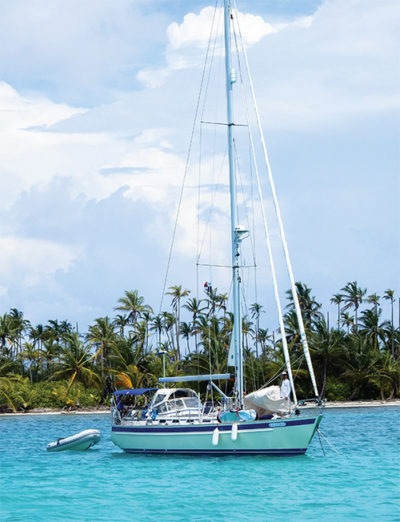
Photo Courtesy Robert Lahue ’99
The Lahues sailed aboard the Alkemi, a 45-foot sloop.
As he looks back on the voyage, a dream Lahue had harbored for so long, he thinks about how it turned out differently from what he had envisioned so many years earlier. “I thought it would be about seeing cool places and being in tropical destinations,” Lahue says, “but ultimately, it was about spending more time with family and learning to appreciate a simpler life.”
To hold on to that simpler, more laid-back lifestyle, the family has moved to their ski condo in Stratton Mountain, Vermont, and Robert and Betsy are now trying to figure out what the next step in their careers will be. They’re hoping to tackle an entrepreneurial opportunity.
They’re also hoping one day to return to the sea. Next time, they want to sail and explore the Pacific.
]]>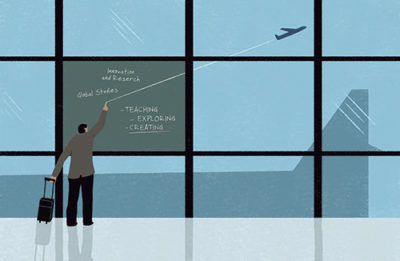
Illustration: Martin Elfman
I have many favorite memories of teaching my offshore elective, “Paris Startup Strategy,” this summer, including visiting the Louvre, the Musee d’Orsay, and the Palace of Versailles; seeing how Paris is increasingly becoming a startup hub; enjoying the city’s many great restaurants; and our final evening, a three-hour dinner cruise on the Seine that culminated with a close-up view of the Eiffel Tower as it lights up. In the class, students learn new concepts and see how they apply to the startups we visit. They also do consulting projects and get to know a bit about French culture and history. Many students tell me that the course is one of the best experiences of their Babson careers, and it helps them to get consulting jobs and internships in Paris.—Peter Cohan, lecturer of strategy
The India Office Records archives at the British Library in London has 14 kilometers of shelves full of boxes of papers and official publications on the East India Co. and the British administration of India. This August, I visited the archives for three weeks to do research for my book on the urban history of colonial India. The book is provisionally titled City Unplanned and investigates the neighborhoods of Calcutta in the early 20th century. The book argues that neighborhoods in India are more than geographic spaces; they are communities where self-government by Indians existed long before the country achieved independence in 1947. Although the archives kept me indoors, I made a point to spend time at Regent’s Park and its outdoor theater. London is a wonderful place to be in the summer.—Nabaparna Ghosh, assistant professor of global studies
My summer started with a trip to Israel for a finance conference. I was there around the opening of the U.S. embassy in Jerusalem, and although my family was concerned, I found the country in a vibrant, dynamic, and festive mood. The conference was demanding, as the crowd consisted of big names in my field, and I was presenting a relatively new paper, which examines when and why firms exercise real options. I did take time to see the bustling port of Jaffa and the metropolitan city of Tel Aviv and to float in the Dead Sea, while not forgetting to take my own pilgrimage to Jerusalem. It was a whirlwind trip before returning to campus to teach summer courses.—Jerome Taillard, associate professor of finance
]]>
Illustration: Sam Island
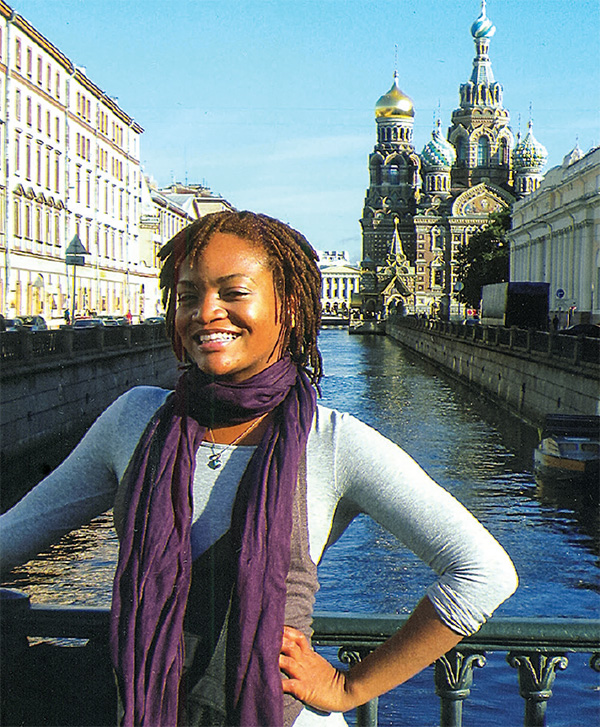
LaShonda Cooks ’10
I couldn’t wait to try borscht. I ordered the beetroot soup on my first night in St. Petersburg, when our group went out for dinner. Mid-meal, an older Russian gentleman came up to our table and asked me to dance. Everybody egged him on. “Go! Dance!” they told me. I blushed the whole time we two-stepped. St. Petersburg was a fairy tale. It had luxurious palaces, beautiful churches topped with gilded copper, and brilliant-colored tiles.
Vasilyevsky Island, where we slept, is connected to the rest of St. Petersburg by drawbridges that go up daily around 2 a.m. and don’t drop back down for crossing until around 5 a.m. One night after hitting a club, where we danced in a mock hip-hop battle with locals, we raced against the clock, our taxis scurrying across the bridge just in the nick of time.
None of my group spoke the language well, so when we first arrived we pantomimed a lot and asked “What’s this?” in Russian while pointing at menus. Luckily, our hosts accommodated us. By the end of our month’s stay, I had mastered the essentials, learning to say “chicken,” “how much,” and “tea with milk, please.” To this day, my ears still perk up when they hear a little Russian. Or Mandarin. I was traveling as part of Babson’s BRIC program, which takes students to some of the world’s fastest-growing economies. Our group also studied in China. In Beijing, I fell in love with Sichuan lamb. It was so spicy, drops of sweat snaked down my forehead. But my favorite moment was climbing the Great Wall. It was surprisingly tough: tiny steps in some areas, huge bricks in others. At the end, we zip-lined across a small lake to a nearby village. I am eternally grateful for the BRIC experience. I learned to face the unknown with grit, patience, and a smile, a lesson I still use daily.—LaShonda Cooks ’10
Ghana Inspires a Startup
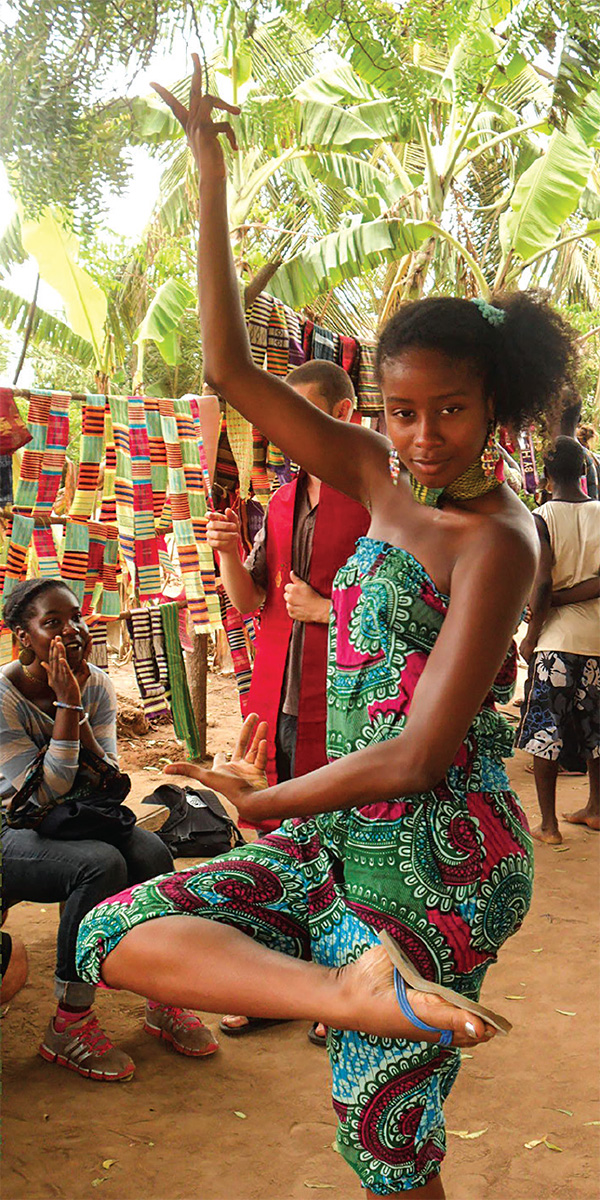
Renee Edwards ’13
It’s 6:30 a.m. on my first day in Accra, Ghana. I unzip my mosquito tent, swing my legs off the bed, and walk to the bedroom door. As I step into the hallway, my homestay brother, Kwesi, greets me and asks if I want koko (corn porridge) and fresh fruits for breakfast. I do. The chickens from his urban farm cluck and shuffle in the backyard, and his rooster crows at random.
Kwesi hands me a five-gallon bucket half-filled with water, and I head to the bathroom to take a quick, cold bucket bath, holding my breath before dumping the remaining water over my body. I get dressed and head to the dining room. Kwesi and I talk casually through breakfast. He teaches me a few words in the Ghanaian languages of Fante, Twi, Ewe, and Ga.
For dinner, he tells me that he’s going to make a vegan version of jollof rice, a traditional Ghanaian dish, to accommodate my diet. Kwesi’s jollof would become my favorite meal in Ghana, and this table would become home to late nights and countless hours of conversation about life, love, our hopes, and our dreams.
This story describes a fraction of the gifts that Ghana gave me. After four months of studying and traveling with 18 students around the country, no one memory stands out above the rest. There were moments of connection, like talking with Kwesi for hours, or listening to my Kumasi homestay mother recite folk stories in Twi. There were moments of celebration, like dancing and singing in every village and town we visited. And there were moments of creativity, like making batik prints in Accra, weaving kete cloth in the Volta region, and making beads from scratch in the Ashanti region.
What stands out is a feeling of complete peace and connection—to the people, the food, and the environment. Years later, my experiences in Ghana inspired me to start my business, Never Underestimate Simple, a beauty and wellness company focusing on the power of nature and simplicity to help people look and feel happy, healthy, and beautiful. Ghana lives through our message of helping people slow down and connect—to themselves, their bodies, their environment, and each other.—Renee Edwards ’13
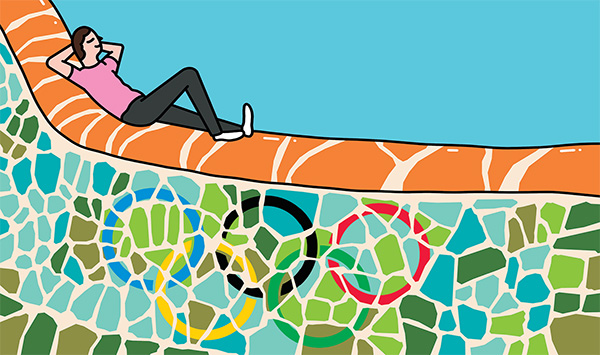
Illustration: Sam Island
An Olympic Summer in Spain
I had realized that I did not want to be an accountant. At the time, international business was a new major at Babson and seemed like a great fit for me. As part of the curriculum, I needed to take another language, so I decided to study Spanish abroad in Barcelona in the summer of 1992. Roy Avellaneda ’93 joined me.
We stayed with a family who wanted their sons to have exposure to Americans. The family spoke fluent English, but we encouraged them to speak in Spanish, which forced us to learn. One of their homes was in Costa Brava, where the family would go and bring us on the weekends. I would compare Costa Brava to Cape Cod in Massachusetts. Their sons introduced us to their friends, who welcomed us with open arms. They took us to the beach, where we went cliff jumping and windsurfing, and to the “discoteca.” One Sunday, we had a wonderful fiesta with the entire family. Paella was served, and it was delicious.
One of my more memorable experiences was a night at Las Ramblas, one of the main areas of Barcelona. The city was buzzing. The Olympics were held in Barcelona that summer, and the Dream Team had just won the gold medal for basketball. Roy and I noticed a large fancy bus coming down the street. We decided to follow. There was police activity around the bus, and we had a feeling it contained important people. Magic Johnson got off, then Chris Mullin, Charles Barkley, and Larry Bird. The entire team was on the bus. We screamed “USA” and let Larry know we were from Boston. The players were friendly and seemed appreciative.
Seeing Olympic events was memorable, but learning another language and culture was invaluable. Since graduating from Babson, I have worked as a financial adviser. It feels good to be able to communicate with my clients who speak Spanish. But Spain not only helped me learn another language, it also helped me view the world more broadly. Learning about different cultures and the way that they do business is important in our global society.—Adam Sachs ’93
From the Dominican to India
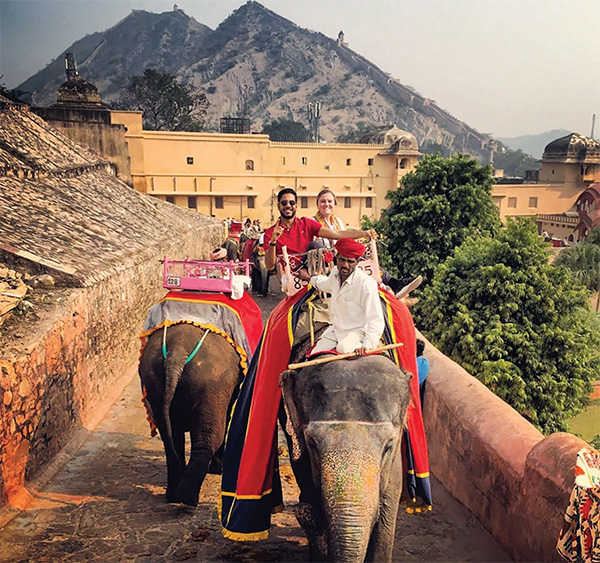
Josuel Plasencia ’17 (riding, left)
In this warm culture, the expectation is a smile, the food is rich in flavor, and a dance always accompanies the music. Where is this? In my homeland of the Dominican Republic. In my country, hospitality trumps everything, love is an ingredient in the dish called mofongo, and nights become dawn through the dance steps of merengue and bachata. Growing up, I never thought I would find another place like home, but that changed when I studied abroad with the BRIC program. In India, our third and final stop (after Russia and China), I was hit with all the feelings of home. Mofongo became biriyani, merengue went Bollywood, and the smiles multiplied, since India’s population is 125 times larger than that of the Dominican Republic.
I also felt uplifted when we took a group trip to Bal Ashram, a recovery center and new home for children who were victims of child labor. Trauma occurs when you don’t know your given name, your birthdate, or who your parents are, but Bal Ashram is the beginning of a new life. To see the positive energy of the children, who smiled like the world is theirs despite their history, was inspiring.—Josuel Plasencia ’17
Feeling at Home in India
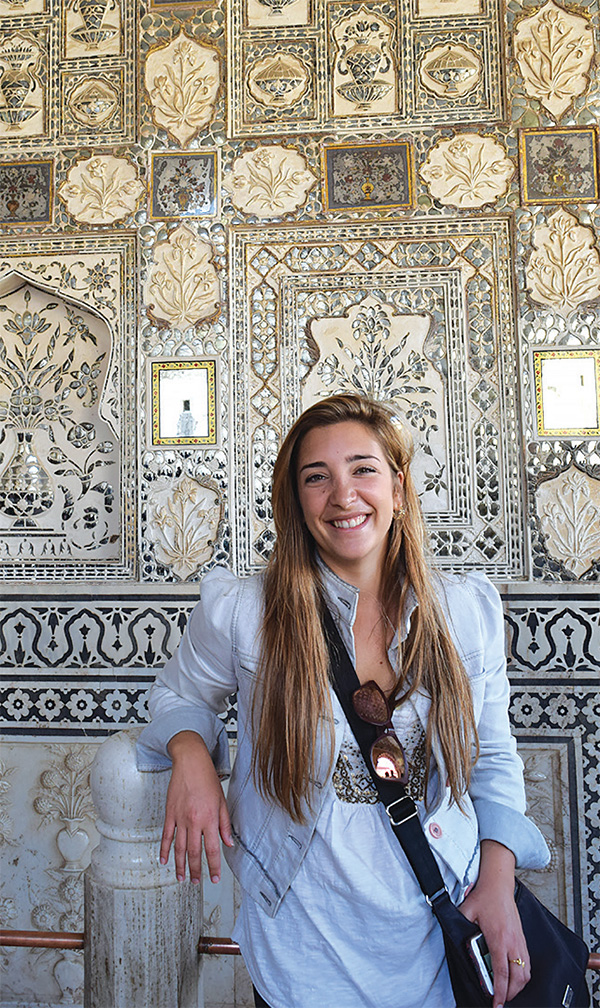
Marielle De Blois, MBA’16
I knew I would be interacting with people from many different cultures at Babson, but I never imagined traveling across India for more than two weeks with 30 of my classmates. This trip came about because I was dating Shishir Patil, MBA’16. He’s from India, and since I am from Venezuela, I was intrigued by his culture and how different it was from mine. I wanted to visit India to truly experience it. Shishir planned the entire trip for what we imagined would be a small group, just me and two friends. But then we decided to post it on our class Facebook page so that people could sign up, and many did.
We went during the January break, starting in Delhi, which is in the North, and traveling south to Bangalore. We visited large cities such as Mumbai, as well as traditional villages such as Jaisalmer in the desert and Alleppey along the sea. We visited a couple of family-owned factories that make clothing. They were small and everything was made by hand. Each of them probably had just a couple of workers, and they allowed us to do some prints ourselves.
The food in India was amazing, the colors were spectacular, and the scenery was majestic. But what impacted me the most during this trip were the welcoming and warm Indian people. So many Babson students from India went out of their way to make us feel at home. When a classmate and I arrived in Delhi at 4 a.m., Siddharth Astir, MBA’16, picked us up at the airport and took us back to his house, where he and his family had prepared a feast to welcome us. The following day Rishiraj Kessar and Danish Kakar, both MBA’16, arranged a party at the farmhouse belonging to Rishiraj’s family. They had caterers, music, and drinks for us to enjoy. Other classmates also invited us to their homes when we stopped by their cities.
Our hosts truly overwhelmed us with their kindness. They inspired me to be more like them, not only to welcome guests to my country, but also to show this kind of generosity to others in my day-to-day life.—Marielle De Blois, MBA’16
Seeing Business Boom in Ireland

Illustration: Sam Island
Two things stand out about my study-abroad experience in Ireland. First, I loved having the chance to get to know a few of my classmates better. These kinds of trips bring you together differently than the group work on campus. I still think about a number of happy memories, such as touring the Baileys factory with everyone. We each received a bottle of Baileys as a souvenir, which we proceeded to enjoy with our coffee for the remainder of the trip.
Second was the ability to witness so much of what I had learned in the classroom in action at major corporations and in the country. The Celtic Tiger was roaring when my MBA group visited in March 1999, and we had the chance to visit EMC, Dell, and other companies that were booming. Jobs were plentiful and well-paid, and housing was exploding.
This was a complete reversal of fortune for Ireland, which had battled a young labor exodus for decades. I actually had been to Ireland in the early ’80s, when it was a monumentally depressing place and the young people were exiting as fast as they could. I was only a teenager, but I could see that the future looked bleak for people just a few years older than me. To return almost 20 years later and see the place thriving, that the Americans and English were eager to be working there, and that the young Irish had fabulous jobs, was incredible.
This trip was the first time I had traveled and seen businesses in action. My travel always had been for tourism or as an exchange student, so this trip offered a whole new way of looking at a country and its people.—Rachel Connell, MBA’99
Learning in Japan in the 1980s
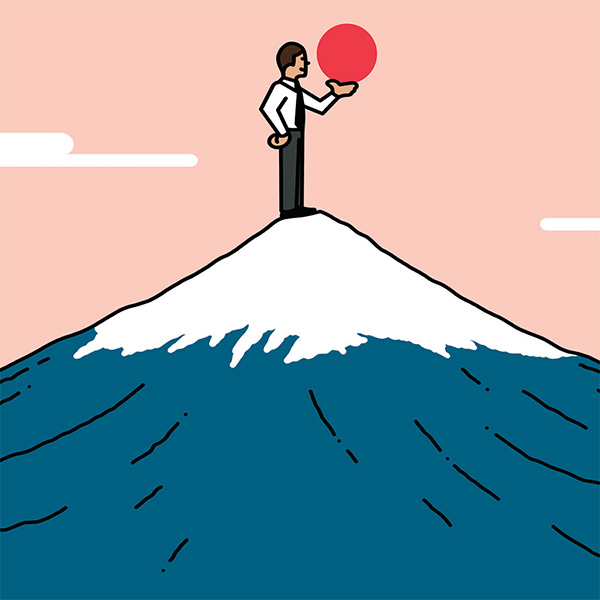
Illustration: Sam Island
The summer between my sophomore and junior years, professor David Hennessey took a few of us to Japan for the class “Japanese Business Management.” We learned the buzzwords and management terms for which the Japanese were famous. Remember that back in the ’80s, Japan was seemingly buying everything it could in America, just as China appears to be doing today. It was the place to go if you were interested in business.
The trip was a mix of lectures and cultural experiences. I was fascinated to be in a country where English wasn’t the primary language, giving gifts to your host was an important practice, and doing a slight bow to a senior manager was customary. (I had never done it before. I always thought that was reserved for royalty.) Manufacturing was huge, and we toured Murata Machinery. (Anyone remember those fax machines?) We also toured Toyota and Yamaha. We learned some Japanese, and while traveling on bullet trains, some local businessmen taught us a few drinking games.
We learned about the Japanese educational system, and about the pressure to succeed and the high expectations that families often had for their children. The kids in the school that we were associated with had a sense of urgency and seemed to be driven to succeed. And in terms of business, we noticed that there were very clear lines for the pecking order of who was the boss. Looking from the outside, you could tell in meetings, classroom sessions, and company visits that there was one way to do things, and no one seemed to question it.
All in all, it was a great trip and a wonderful time to be in school.—Willie Nelson ’88
Interning in China
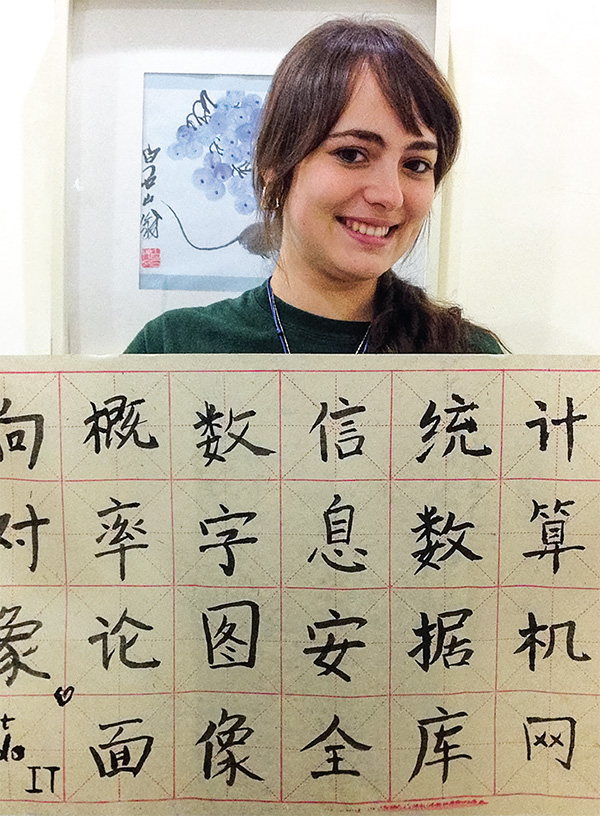
Roxelane Wagner ’16
I studied abroad in Shanghai, China. It’s an amazing city—huge and busy. The streets are crazy. I had an app that helped me find my way around the subway system.
I took various classes, and every morning I had two hours of Chinese language. I also had a Chinese roommate, which I liked a lot because I could communicate with her in Mandarin. She would tell me about her life and where she was from, and she would help me with my homework.
I had two internships, and they were extremely different. For one, I was an English instructor for a leading manufacturer of foam plastics in Asia. For the other, I was a business development manager assistant for a beer distribution company. For that internship, I was asked to help out at various company events and was able to work directly with Chinese consumers. I found that to be especially interesting, because it wasn’t theory. It was practical and different from just hearing about consumers.
I had a great experience abroad. If you have the opportunity to be outside your comfort zone, I recommend that you do it. You won’t feel as uncomfortable with people who are different from you in the future.—Roxelane Wagner ’16
]]>Raygorodskaya has a reason to celebrate this evening, but that’s nothing new. Her business is going well. Actually, it’s better than well. “We just hit a sales record this week. That happens all the time now,” says Raygorodskaya, a menu open in front of her, the dinner crowd slowly filling up seats around her.
Raygorodskaya is co-founder and CEO of Wanderu, a travel website and app that allows consumers to search bus and train schedules and book tickets. Think of it as Kayak for ground transportation. Experiencing sensational growth, the Boston-based travel company has attracted $8 million in funding in recent years, and billionaire entrepreneur Richard Branson counts himself a fan.
At this moment, though, the matter at hand isn’t business. As she sits in the sleek restaurant, Raygorodskaya is still working on finding a fitting drink. The waitress has returned with a sample, and Raygorodskaya takes a sip. “I can do it,” she says, but adds, “It’s not as sweet as I would do,” a remark that sends the waitress off in search of something else.
Raygorodskaya is someone who knows what she wants. Inspired by the sacrifice and grit of her immigrant parents, Raygorodskaya isn’t afraid to push, to be bold. As she puts it, she’s not content to simply be content. When she was younger, she left behind a modeling career in New York City, in large part because she wasn’t in control. “I like to be in control of my own fate,” she says. “I really quickly realized I hated modeling. You’re just there to have something hang on you while they take the picture.” Later, as a sophomore at Babson, she started a public relations firm focused on fashion. The New York firm thrived and had great clients, but eventually Raygorodskaya left that behind as well. “It wasn’t something I was passionate about,” she says.
When she co-founded Wanderu, Raygorodskaya faced many obstacles: technological hurdles, naysayers, no salary for a year and a half. None of that mattered. “From day one, I knew the company would be successful,” she says. “I’m an entrepreneur. That’s how we are. It’s probably being crazy.”
At the restaurant, the waitress returns with a glass of Moscato d’Asti. Raygorodskaya sips. She nods. The effort was worth it. “It’s perfect,” she says.

Raygorodskaya has known her co-founder, Igor Bratnikov (left), since middle school. “We realized we could work well with each other,” says Bratnikov.
Nothing Is Impossible
Wanderu makes its home in a century-old building in Boston’s Financial District. With its red brick, hardwood floors, and wood beams stretching across the ceiling, the office is bright, open, and quiet, which the engineers of Wanderu appreciate as they code. The only sound you’ll often hear in the office is typing.
Wanderu moved to this space in the fall. With the company’s staff doubling to 25 within the past year, a bigger office was needed. Raygorodskaya’s desk sits by the window, which looks out on the Rose Fitzgerald Kennedy Greenway and offers a glimpse of Boston Harbor beyond. Next to her sits Igor Bratnikov, the company’s COO and co-founder. The two have known each other since middle school. They were part of the close-knit Russian community in Newton, Massachusetts, and met while taking math classes at an after-school program frequented by Russian students. She went on to attend Newton South High School, and he went to Newton North. “He’s my best friend,” Raygorodskaya says.
On a recent Thursday morning, Raygorodskaya walks through the Wanderu office eating banana bread baked by a co-worker and sporting a fish pendant hanging from a necklace. “It’s for good luck,” she says. As they do every Thursday, Raygorodskaya and Bratnikov soon gather in a conference room for a one-on-one meeting. Apollo, Raygorodskaya’s Pomeranian dog, also wanders into the room and sits under the table. Normally Apollo has free rein about the office, but this meeting is just between the co-founders. “I don’t know why you’re in here,” says Raygorodskaya, shooing Apollo out the door. “No one invited you to this meeting.”
Peering at a laptop, the co-founders sit side by side, almost elbow to elbow. Wasting no time with small talk, they delve into business matters, dealing with issues big and small: revenue, travel schedules, Wanderu swag, guest bloggers for the website, efforts in Mexico, head shots, meetings. “They work well together. They rarely have a butting of heads,” says Kate Thompson, Wanderu’s operations manager.
Raygorodskaya and Bratnikov started Wanderu out of frustration. Raygorodskaya was a veteran of many a bus ride while running her PR firm, and she was baffled that no site like Kayak was available for buying tickets. To compare prices and schedules, she had to visit each individual bus company’s website.
That frustration came to a head when she and Bratnikov found themselves stranded in a small town in rural Virginia. The pair, along with a couple of other friends, were taking part in an initiative to raise awareness of national parks and forests. The group was to trek to parks across the country and document their travels. For Raygorodskaya, who has a strong case of wanderlust, this seemed like a great summer vacation.
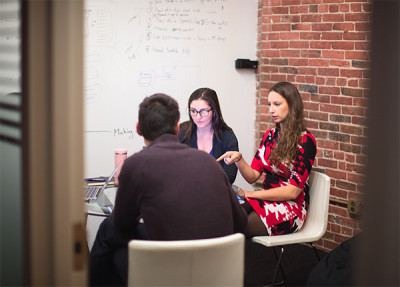
Wanderu employees include creative director Ani Avanian (above) and PR manager Staffo Dobrev (below). “My philosophy is to hire the smartest people and let them do their jobs,” says Raygorodskaya.
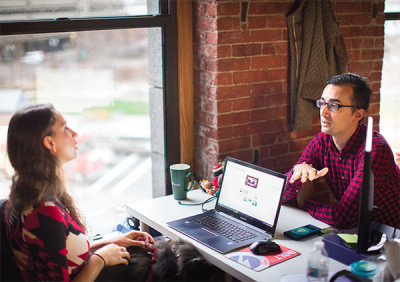
The only catch was that the group had to travel using shared rides, so when a driver canceled on them at the last minute in Virginia, the friends were left stranded. Trying to find bus or train routes to their next destination proved difficult without a Kayak-like site. Eventually, the group broke down and rented a car, but for Raygorodskaya and Bratnikov, a business idea was born. “We decided this problem has to be solved,” Raygorodskaya says. “We’re doing this.”
To start Wanderu, the pair dropped everything else. Raygorodskaya gave up her PR firm and a sought-after loft in Soho, while Bratnikov passed on a tempting job offer that was waiting for him when he graduated law school. Both moved home with their parents in the Boston area and went to work. “It was just the two of us and our own savings,” Bratnikov says. Early on, the pair heard from many in the bus industry who said a centralized travel site couldn’t be done. The industry was too old and entrenched, and each bus company had its own data and system that would need to be integrated into the central site. “If someone said no, we got pissed off, had a drink, and said, ‘Screw that,’” Bratnikov says. “We don’t take no easily.”
Wanderu launched in 2013 and, in time, proved the naysayers wrong. Today, the site works with more than 40 bus companies, and users can peruse about 160,000 bus and train routes for some 2,000 stations across the U.S. and Canada. “Nothing is impossible,” Raygorodskaya says. “That’s something we learned from the very beginning.”
No Reason I Can’t
Facing down the impossible is a big part of Raygorodskaya’s job. After her meeting with Bratnikov, Raygorodskaya returns to her desk to pursue an advertising opportunity that seems a long shot: getting Wanderu’s ad on a billboard at the well-traveled entrance of New York’s Lincoln Tunnel. She spotted the billboard when she was last in the city, and now she has to have it.
“It’s a good spot,” says Raygorodskaya, talking to Wanderu’s creative director, Ani Avanian. This causes Bratnikov to chime in from his seat, “It’s insanely expensive.”
“I’m trying to get it down,” replies Raygorodskaya, undeterred. The billboard owner has a month that is uncommitted to an advertiser, but Raygorodskaya isn’t happy with the price he quotes her. “I said, no, that’s not going to work for us,” she says. Others in the office are unsurprised by Raygorodskaya’s persistence, her willingness to haggle and deal. “She will never buy anything at full price,” Thompson says. “It’s amazing how thrifty she is.”
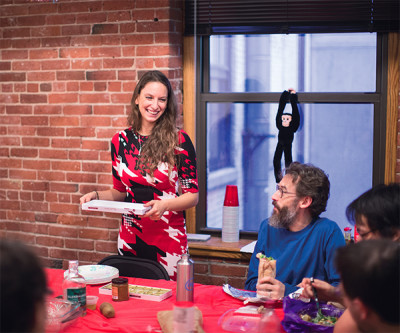
Shared lunches (above), yoga sessions, liquor tastings, and beloved pet Apollo (below) are all part of Wanderu. ”I want an office where I feel at home,” Raygorodskaya says.
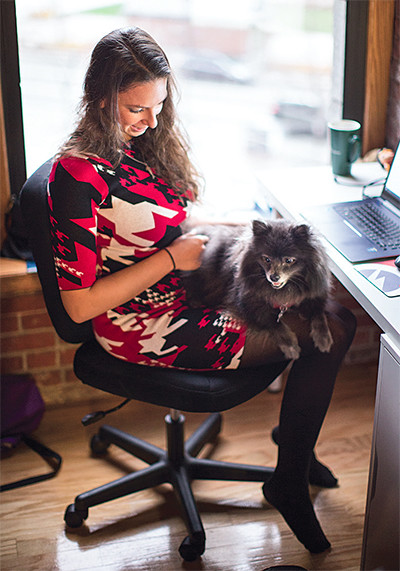
Whenever she confronts a challenge, Raygorodskaya thinks of her parents. When she was 4 years old, they left behind their lives and careers in St. Petersburg, Russia, and moved with Raygorodskaya and her older brother to the U.S. Her parents dreamed of a better life for their children, but the move wasn’t easy. The family had no money, and they squeezed themselves into a small apartment in Somerville, Massachusetts. Her mother worked as a research assistant, and her father, who barely spoke English, worked as a pizza delivery driver. Knowing he needed a better job to support his family, which soon included another son, he saved his money and began taking computer classes at night. He eventually became an engineer, and that determination and success inspires Raygorodskaya. “They started with nothing and had a whole family to take care of,” she says. “They made it work, and there’s no reason I can’t.”
Later at the office, Raygorodskaya learns that the billboard owner has accepted her offer. Avanian immediately goes to work on designing the ad.
Diving with Sharks
Around noon, a curious smell begins to waft through the Wanderu office. A yoga teacher has arrived, and she has lit incense in the back conference room, where employees move aside a pingpong table so they can lay down their yoga mats and practice. On the conference room wall, near a standing desk with a treadmill, press clippings are framed along with Richard Branson’s scorecard from a startup competition called the Extreme Tech Challenge. Last year Wanderu was one of three finalists, all of which were invited to Necker Island, the entrepreneur’s private getaway. Raygorodskaya and Branson talked about transportation, the billionaire taking notes the entire time, as reportedly is his habit. “He got it,” says Raygorodskaya, who found the acknowledgement gratifying. “What we’re doing matters.”
Now that lunchtime has arrived, Raygorodskaya leaves to grab something to eat. She’s joined by Bratnikov and Staffo Dobrev, Wanderu’s PR manager. Their destination is a nearby Thai restaurant, where Raygorodskaya orders one of her favorite dishes, spicy hot basil. Dobrev has known Raygorodskaya for years, having first worked at her PR firm. Like others at Wanderu, Dobrev praises the respect and support Raygorodskaya gives her employees. “If she sees value in you,” he says, “she will invest in you and nurture you and teach you so you can reach your full potential.”
Lately, Raygorodskaya has been trying to convince Dobrev to go scuba diving. She’s certified, and Dobrev is open to the idea, except for one thing: what might be lurking underneath the water. “I’m scared of sharks,” he says. “She says, ‘If you don’t bother them, they won’t bother you.’ I don’t know about that. Would you go diving with the sharks?” (Asked later about the danger of sharks while scuba diving, Raygorodskaya says, “There are sharks. But they’re small. They’re not great whites or anything.”)
Raygorodskaya certainly has an adventurous streak. It’s no accident she started a travel company. She has traveled to all 50 states and some 30 countries, including New Zealand, Bora Bora, and Myanmar, and she’s constantly on the road for work, whether participating in conferences or meeting with potential partners and investors. “If she had a free month now, she would pack a bag with a few pieces of clothing and see the world,” says Bratnikov. “She loves being out, being free.” For Raygorodskaya, scuba diving, traveling, and entrepreneurship are about the same things—meeting people, pushing yourself, and having experiences. “Nobody who is an entrepreneur wants an ordinary life,” she says.
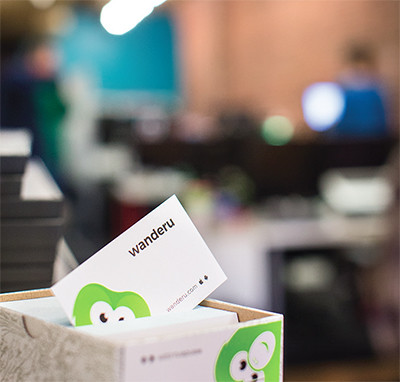
When she has the opportunity, Raygorodskaya likes to talk to college students about her experiences. At Babson, she felt inspired to take on a business, and she wants to do the same for others. She tells students of her successes and failures, the path that has taken this child of immigrants from modeling, to the PR firm that was her first startup, to her success with Wanderu. It’s a journey that has left her, quite simply, happy. “I love, love what I do,” Raygorodskaya says. “I enjoy working. This is my baby.”
After lunch, Raygorodskaya and Thompson leave the office for a special assignment, heading to a wine store that is conveniently located only a few doors away. Raygorodskaya and her team are not bashful about celebrating successes, and today brings another in a long line of them. On the tech side, the company has constructed a more efficient way to receive pricing and trip data from bus companies. The effort took months of work. “We need some Champagne,” Raygorodskaya tells the store clerk, who leads her to a fridge in the corner. The entrepreneur pulls out two chilled bottles.
Back at the office, Raygorodskaya returns to her desk to do more work. At a table nearby, the Champagne waits to be popped.
]]>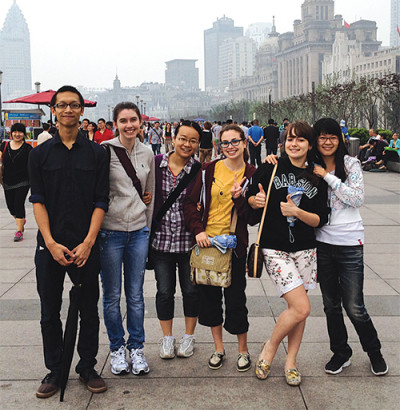
From left, Michael Ninh ’15, Molly Ronan ’16, Qin Na (Tongji University), Amelie Bushong ’16, Roxelane Wagner ’16, and Xue Mei (Tongji University) at The Bund in Shanghai
Study Chinese in a Babson classroom for three weeks, then hop on a plane to visit Shanghai for 10 days to practice what you learned. That is how a group of first- and second-year students spent the beginning of their summer when they took “Chinese Language and Culture for Global Professionals.”
A new offering, the course was designed in part to expose students to global experiences and language earlier in their academic lives. “Because we have such a packed curriculum, it can be hard to fit in language or study abroad before your junior year,” says Jenny Rademacher, assistant professor of Spanish and director of the language program. “But if you want to do something global, you should be thinking about it earlier and with more intentionality. So we thought about how we could encourage that.”
Weina Zhao, senior lecturer in Chinese language at Babson and Wellesley College, developed the course, focusing on language typically used in business settings. Combining classroom study with a trip to Shanghai made sense to her. “To be honest, you need an understanding of language and culture with Chinese,” she says. “If you don’t understand both, you will have problems. China is more Westernized now, but there are still some differences.” She gives a few simple examples: “In China, when you say, ‘Oh, your English is so good,’ Chinese people will say, ‘No, no, it’s just so-so.’ It shows they’re modest. American students say, ‘Thank you.’ Or if you attend a business banquet in China, you cannot pick any seat. The seat facing the door is for the VIP.”
While at Babson, students focused mainly on writing and pronunciation, although Zhao would add conversational snippets to lighten the intense study. After taking a written exam, they left for Shanghai to practice their language skills. Two Chinese students from Babson- partner Tongji University attended classes to help Babson students. The Tongji students also came on excursions, which the group took every afternoon, to places such as the World Financial Center and The Bund, a historical, walking section of the city on the waterfront. Students had plenty of time to explore on their own as well. The trip ended with an oral exam.
Molly Ronan ’16 had been to Beijing with her family before taking the course; she wanted to visit the more modernized Shanghai. “The hardest part was speaking to order lunch and dinner, because we were on our own a lot for that,” she says. “A lot of times we’d go with our Chinese tutors, so they’d help us.” An interest in pursuing international business after graduation influenced her decision to take the course. “Knowing Chinese would help me immensely,” she says.
Amelie Bushong ’16 already had been to China as well and had studied conversational Chinese, but she was still intrigued by the summer course. Travel abroad the end of first year? “That does not happen,” she thought. She enjoyed the experience, from learning traditional Chinese writing to exploring the old and new sections of Shanghai to bargaining with Chinese vendors to eating dumplings and rice for breakfast. Bushong also is interested in studying international business. “We learned a lot—it was a lot of cramming,” she says, “but it was really impressive.”—Donna Coco
]]>There was just one problem: During games, he didn’t want to shoot. “It was frustrating,” says his former coach, Norm de Silva ’09. “He would rather just pass. I had to literally beg this kid to shoot.”
De Silva wasn’t accustomed to such an attitude. Watch a U.S. college or NBA game—players want the ball in their hands, and they’re not afraid to launch it toward the basket. But this wasn’t the U.S. De Silva was head coach of the Foshan Long Lions, a team that plays in China’s professional basketball league. In China, de Silva discovered that while the rules of basketball were the same, the game can be quite different.
The Lions’ talented 7-footer came from a poor farming town, and he didn’t want to ruin the financial opportunity that being a member of the team had provided. “If he became the focal point, and the team didn’t do well, he worried that he would face blame,” de Silva says. “He would rather not take the risk.” So even though he was a great player, the young talent didn’t like all the playing time de Silva hoisted on him. Through a translator, he asked his coach during games, “Do you want to play someone else?”
Another World
To hop on a plane, fly thousands of miles, and land in a country much different than his own was a big step for de Silva. “I had never left the country until I stepped off the plane in China,” says de Silva, who grew up in Massachusetts. “I didn’t even have a passport before getting the job.”
But de Silva was dedicated to making a career in basketball. He had experience, having previously worked as an assistant coach in the college ranks and with two teams in the NBA’s minor league system. So when the opportunity came to coach in China, which is hungry to learn from the basketball-savvy Americans, he decided to go for it. The position offered good money and a chance to further his career, but de Silva wasn’t prepared for feeling so lost and overwhelmed by the foreign land. “It was crazy,” he says. “My head was on a swivel at all times. You think, holy crap, what have I gotten myself into?”
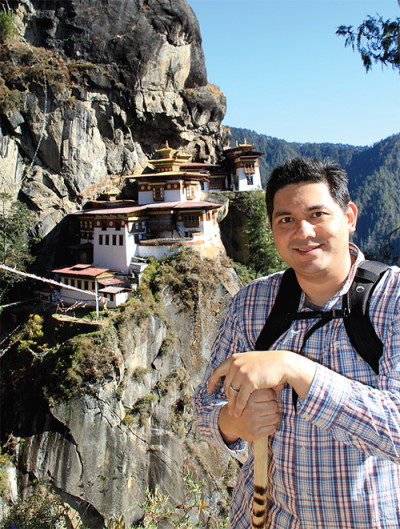
Lawrence Ganti ’97 has lived in Switzerland, Japan, and India, where his work for Merck brought him to Bhutan, shown above. He currently resides in Brazil and is Merck’s Latin America president.
Lawrence Ganti ’97 knows this feeling well, though while growing up in New Jersey, he admits that he didn’t think much about the rest of the world. Ganti’s views started to change at Babson, where he met many international students, and after obtaining his MBA overseas, he has lived and worked in Switzerland, Japan, and India. With his wife and two well-traveled dogs, he currently resides in Brazil, where he is the Latin America president for Merck.
When you first settle in a foreign country, where everything is new and unfamiliar, your brain is overloaded, Ganti says. “The first few weeks are like drinking from a fire hose. Everything just hits you. There’s no break,” he says. “Turn on the TV, it’s all in Japanese. Go to Starbucks, it’s all in Japanese.” At times, in the middle of this cultural onslaught, Ganti found himself just longing for a pizza.
Before Cyrus Sabouri ’08 left New Jersey for the island nation of Bahrain, where he works for American Express Middle East, he felt the enormity of what he was about to do. “It was about going into the unknown,” says Sabouri, head of the Revolve (interest-bearing) products portfolio and membership rewards program. “You don’t realize what you’re doing until you hug your mom and realize you won’t be back for a long, long time. That was a difficult goodbye.”
Then he landed in Bahrain, where the October temperatures soar into the high 90s, the taxi drivers continually tried to overcharge him, and his temporary housing was next to a fish market. “It was the most foul smell to come home to every day,” he says. “It didn’t feel like home at all.”
Sabouri’s parents were born in Iran and came to the U.S. in the 1970s, and, as he grew up, they encouraged him to see the world. “The globe is your playing field,” they told him, and he took their words to heart. But those first few weeks in Bahrain were a test, a crash course in a new way of life. “It was a scary time of transition,” he says. “You’re confronted with different kinds of people, a different language, and a feeling of self-doubt.”
Over time, those doubts fell away and Sabouri made friends. But as with anyone living abroad, the adjustments to his new home continue. The unavoidable truth is that he’s different. Conspicuously so. When Sabouri goes to a coffeehouse with a Bahraini friend, the American is conscious of how clunky his Arabic is. Sabouri also doesn’t wear a thobe, a traditional ankle-length garment worn by many Bahraini men. “You can pick me out from a mile away,” he says. During Ramadan, a holy month when people spend much time with their families, Sabouri becomes acutely aware of just how far away he is from his own loved ones. “Everyone is together with their families,” he says. “What can you do when you’re a single bachelor?”
Differences in Business
In the office, cultural differences can play out in multiple ways. When Ganti’s work with Merck first took him to Japan, he was struck by how comfortable his Japanese co-workers were with silence. During meetings in the U.S., people are typically uneasy with quiet and fill a lull with talk. Not so in Japan. Even lunchtime is carried out in a hush. “You don’t break the silence unless you have something relevant to say,” says Ganti, who learned to measure his words before speaking.
Ganti also came to recognize that the Japanese value the team over individuals. When dealing with the review of a poor performer, for instance, he started using the word “we” a lot. He would tell an employee, “We need to make improvements,” or “We can solve it together,” diverting the emphasis away from the individual. “It isn’t about throwing a guy out on the ledge and saying you need to handle this on your own,” Ganti says.
The Japanese value the building of trust and relationships, he adds. In Japan, nothing might be accomplished in an initial meeting, as everyone gets to know each other, and no real progress may be made until the parties sit down for a lunch or dinner. Ganti remembers greeting foreigners who flew to Japan with the intention of holding their meeting and flying out that same day. “It’s just a half-hour discussion,” they told him. He replied, “That half-hour discussion won’t go anywhere.”
Sabouri has experienced a similar emphasis on relationship building in the Middle East. “Meetings can require personal introductions, which often consume more of the meeting than the agenda itself,” he says. Sabouri was frustrated by this custom when he first moved to Bahrain. “You eventually learn that there can be a fine line between business and personal life,” he says. “Warm and hospitable introductions can be the difference between deal and no deal.”
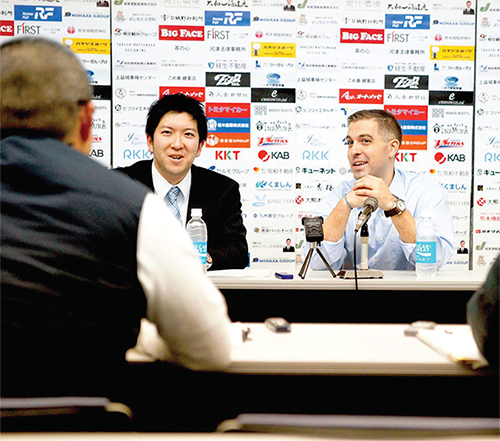
Dedicated to making a career in basketball, Norm de Silva ’09 (right) has served as head coach in China of the Foshan Long Lions and in Japan, shown above, of the Kumamoto Volters.
De Silva faced some tricky cultural differences when coaching in China, particularly in regard to the team’s intrusive management. De Silva began as an assistant coach with the Foshan Long Lions, but when the team got off to a bad start and the organization’s higher-ups brought in a consultant to help stem the tide, the Lions’ American head coach resigned over the intrusion. De Silva then was named head coach, albeit an interim one with a narrow margin for error.
De Silva had never been head coach before, and his first game leading the Lions was broadcasted all over China. “National TV over there is like a fifth of the world’s population,” he says. During that first game, the team’s owner, general manager, and consultant grabbed de Silva in the hallway and told him what to do and who to play. De Silva respectfully nodded his head and then ignored their directives. The team won. “If we had lost the game, I wouldn’t have been the coach the next day,” he says.
For a while, de Silva wondered from day to day whether he would be fired. “It was rocky waters at first when I took over,” he says. Under his direction, however, the team kept winning. The Lions went 10 and 5, which set off a sensation. His face was plastered on billboards. The national paper ran a front-page picture of the 5-foot-8-inch de Silva, the headline reading, “Small Man, Big Wisdom.” When he left the gym after a practice or game, a hundred people would be waiting to take his picture or get his autograph. “I’m sure my head was inflated,” de Silva admits. A filmmaker even began following him around, and the resulting documentary, Jiaolian [Coach], played in film festivals.
Despite the success, the team’s executives were frustrated with de Silva, who continued to ignore their edicts. “It’s hard to navigate the management in China. The people in power are never challenged,” he says. “Every time the GM saw me not listen to the consultant or owner, it really questioned their status. It was risky for me to do. They knew I couldn’t be controlled, and that was scary for them.” But with de Silva so popular in the media, the team never disciplined him. They waited until the season ended to inform him he wouldn’t be brought back.
While he had trouble with the team’s management, de Silva got along well with his players, who respected his authority. “If you are the coach, whatever you say goes,” he says, an attitude that contrasts with what is often found in the NBA. “A professional player in America thinks they know more than you do,” he says.
How to Navigate
Figuring out how to handle these cultural differences takes time, note all three alumni. Being flexible is key, says Ganti, as is pushing aside any preconceived notion. “I never take the approach that it’s not the way we do it in America,” he says. To better understand a country’s culture, Ganti likes to explore his new settings and is not afraid to get lost. He avoids hanging out with fellow ex-pats, instead seeking the company of locals. “As many Americans, I am linguistically inept,” he says, but adds, “I’m generally a fast learner when it comes to culture. I find cultural understanding is as important as understanding the language.”
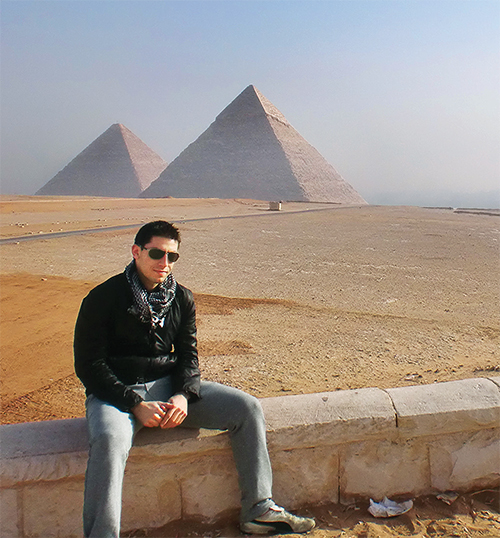
Working for American Express Middle East, Cyrus Sabouri ’08 has been based in Bahrain for seven years, but his job takes him all over the Middle East and North Africa, including to Egypt.
Remember how Ganti grew accustomed to respecting silence in Japan? He next lived in India, where conversations are boisterous and full of interruptions. “Silence is never expected,” he says. “You can’t get any more different than Japan and India.”
Ganti’s current job with Merck takes him throughout Latin America. Each country presents its own cultural puzzle to figure out. Sometimes, he chooses to ignore culture. In many parts of Latin America, for instance, giving direct feedback in conversation isn’t typical. So to make a point, he may do just that in meetings, and attendees are taken back. “I’m usually sent places where change is needed,” he says. “Sometimes to make change, you have to rock the boat.”
Like Ganti, de Silva has had to make adjustments when moving from one country to another. After working with the amenable basketball players in China, he next spent a season coaching the Kumamoto Volters, a professional team in Japan, where de Silva discovered how important one’s age is. “In Japan, you don’t challenge someone older than you,” he says. “I’m a young coach. At least eight of the guys on the team were older than me.” The older players listened to de Silva, but they also reminded him in subtle ways that they were superiors from an age standpoint. “They would stop practice and ask, respectfully, why I wanted to do something a certain way. They would never do that in China,” says de Silva, who, after being let go by the cash-strapped Volters now works as a scout with the NBA’s Philadelphia 76ers.
For Sabouri, the key to navigating cultural differences is curiosity. His American Express office oversees 18 markets across North Africa and the Middle East, and so to understand those markets better, he likes to travel to the associated countries, talk with people, and ask questions. How do people dress? What do people like to do on the weekends? What’s the political situation? “If you have a curiosity, it changes your perspective,” Sabouri says. “You are no longer bound by your home country.”
Sabouri has worked in Bahrain for seven years now. He plans to return permanently to the U.S. one day, and when he does, Sabouri knows he’ll have a greater understanding for what the world offers. His time in Bahrain has changed him. “I am grateful to have matured as a professional, adult, and citizen of the world,” he says. “It’s been an incredible ride.”
]]>
Photo: Loren Romito
Nan Lian Garden, Hong Kong
Exploring Hong Kong on her own one day, Lorien Romito, director of education abroad, discovered this temple in Nan Lian Garden. Romito traveled to Hong Kong and Singapore during this past winter break as the administrator for one of Babson’s electives abroad.
Throughout the year, Babson offers about 18 graduate and undergraduate short-term courses that include travel during breaks to countries around the world. Trips may include visits to com-pany sites and cultural excursions. For students who seek an alternative to the more traditional education abroad programs, which run for a semester or full academic year, the courses offer a chance to experience other cultures firsthand.
Elise Beaudin, MBA’10, director of electives abroad, says the courses give students a chance to discover how what they’ve learned in class applies to different societies. “It’s also an opportunity to build their resume by seeing how businesses operate globally. There’s a lot of advantages to that,” she says.
Education abroad offers students insights into themselves as well, Beaudin adds. “They gain the perspective of different cultures,” she says, “and can reflect on how their exposure to these cultures affects their view of who they are and what they know.”—Donna Coco
]]>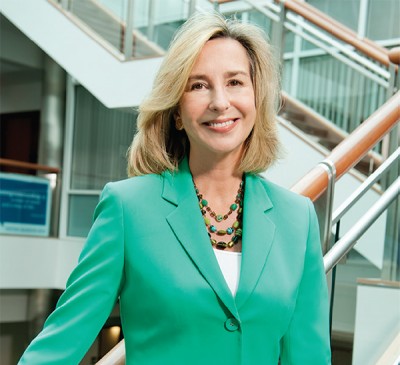
Photo: Webb Chappell
President Kerry Healey
In April, we welcomed two new members into our Alumni Entrepreneur Hall of Fame. Designers Michael Bastian ’87 and Ruthie Davis, MBA’93, came to campus to be recognized for their entrepreneurial successes and the impact of their eponymous labels on the fashion industry. Michael Bastian’s men’s collections are worn worldwide, and A-list celebrities regularly hit the red carpet in Ruthie Davis-designed footwear.
On the heels of the Hall of Fame, we held our inaugural Babson Connect: Worldwide, a regional business summit and global MBA reunion. MBA alumni from around the world joined local alumni and parents, leading South American business executives, and social innovators in Cartagena, Colombia, to celebrate the power of entrepreneurship as a positive force for social and economic change. At the same time, we expanded our invaluable global network and advanced our institutional strategy as the convener, catalyst, and educator of Entrepreneurship of All Kinds. Special thanks to Babson trustee Carlos Mattos, MBA’76, P’17, and the Babson Connect: Worldwide advisory board for their leadership and hospitality.
This month during Commencement we celebrate the accomplishments of hundreds of future entrepreneurial leaders. While graduates eagerly plan for the future, they are reminded that achievement is measured in innumerable ways as evidenced by this year’s honorary degree recipients who each defied convention on their way to realizing incredible success.
Kevin Colleran ’03, our undergraduate Commencement speaker, joined Facebook in 2005 and was a key leader of the executive team that forever changed our online lives. In 2012, Colleran left to pursue venture capital opportunities and serve as a mentor to the next generation of world-changing companies.
Richard Saul Wurman, the creative and intellectual whirlwind who is our graduate Commencement speaker, is relentless in finding new, fun ways to bring together the world’s most exciting thinkers, inventors, and innovators to discuss global issues. As Wurman is the author of 83 books, a renowned American architect, a pioneer of information architecture, a professor, an urban designer, a cartographer, and creator of the TED conference, his impact can be seen and experienced seemingly everywhere.
As a leader in entrepreneurship education, we have both the opportunity and responsibility to redefine and reimagine how future generations of entrepreneurs will be inspired to affect society in a positive way. At Babson, we not only seek out this challenge but also relish it, because we can draw on our history, our experience, and our talent to achieve outcomes of which we all can be proud.

Kerry Healey
]]>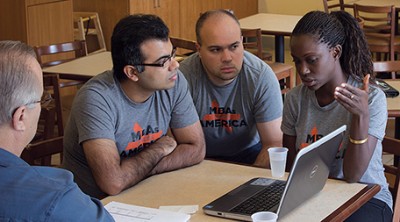
Photo courtesy Peter Cherry, MBA’15
Babson MBA students Mayank Arora (second from left), Phillip Lachman, and Jennifer Odera share their recommendations with Peter Kordell (far left) of Garden Fresh Farms in Maplewood, Minn.
For many students, the college road trip is a memorable way to see the country and have fun. But eight Babson MBA students hit the road last summer for a challenging six-week journey devoted to sharing their expertise with small-business owners across the U.S. The trip combined iconic experiences, such as diner breakfasts, blues bars, barbecue joints, and the breathtaking sights of Big Sky Country, with the opportunity to put their Babson education to work.
Two four-person teams from Babson were selected to take part in a new program known as MBAs Across America (MBAx). The program was created by four MBA students from Harvard Business School who in 2013 skipped standard summer internships to offer free assistance to entrepreneurs around the country. Fired up by their 8,000-mile road trip, the friends founded MBAx to give other students a similar opportunity.
Jennifer Odera, MBA’15, learned about MBAx during an on-campus information session and formed a team with classmates Mayank Arora, Phillip Lachman, and Peter Cherry. Luca Ceschin, MBA’14, a member of the second Babson team, heard about MBAx from classmate and eventual teammate Kip Taylor. They formed a group with Jorge Gutierrez and Alvaro Valdez, both also MBA’14. Teams worked with five to six companies, spending about five days with each and driving long hours on weekends to reach their next stop. To help participants cover costs, MBAx lined up teams with loaner cars from General Motors and free lodging from Holiday Inn.
Although spending nearly two months with three other people had its ups and downs (imagine working long days together, having inevitable disagreements, and then sleeping in the same hotel room), Odera says her team eventually fell into an effective rhythm. They would arrive in town Saturday evening and use Sunday to catch up on sleep and laundry. That night, they would meet for a casual get-to-know-you dinner with the business owners, which allowed the team to hit the ground running on Monday. By Friday of each week, the team presented the owners with a detailed set of recommendations.
Odera especially loved the week with Sarah Calhoun, founder of Red Ants Pants, a company in White Sulphur Springs, Mont., that makes work pants for women. “She mentioned that she’s not really a businessperson, and we realized that a number of things were not set up in the most efficient way,” Odera says. Her team offered advice on topics such as inventory and billing, choosing the right accountant, and the best way to structure bank accounts. The fact that Calhoun could make time for the MBAx process—“she cleared her calendar for us,” Odera says—made that week especially fruitful. Not all the business owners they encountered could spare that kind of time.
Their first week out, Ceschin’s team learned an important lesson about listening to client needs. They spent hours crafting recommendations beyond what the business owners requested. Turns out the owners already knew the information. During the final presentation, the owners were polite, says Ceschin, “but it was clear that they lost interest while we were presenting the ‘extra stuff.’ When we switched to the topics they asked us to work on, their interest came back.”
Ceschin’s favorite stop was with the owners of Channel Islands Outfitters in Santa Barbara, Calif. They held their get-to-know-you meeting on stand-up paddle boards in the harbor on a sunny Monday morning, an experience that Ceschin says helped them all bond. He believes that Babson’s emphasis on entrepreneurship and the fact that he and his teammates all have experience with startups helped them relate to the owners. “We were able to understand the entrepreneurs’ pain and problems,” Ceschin says. “It felt like we spoke the same language.”
Both Ceschin and Odera would wholeheartedly recommend the program to other MBA students. “We hope the MBAx movement continues to grow,” Odera says. “It was a phenomenal experience.” —Erin O’Donnell
]]>